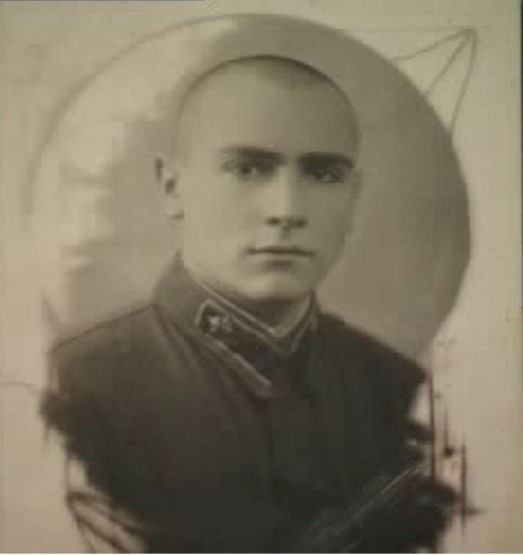Grigorii Zolotushkin was born in 1919 in Kremenchuk, central Ukraine, as Hersh Gotfrid. He was the second of six children. His father Avrum was a baker, while his mother Khaya (née Zolotushkina, a Russian-sounding last name) worked at a tobacco factory. The family was strictly observant in the lifetime of Hersh's maternal grandfather, Leib, who was the gabbai of a local synagogue. When Hersh was five, Leib sent him to attend a cheder, and, when the authorities shut it down, Leib hired a private melamed (religious tutor) for him. After Leib's death, the Gotfrids became less religious. The family was Yiddish-speaking, as were most of the residents of Kremenchuk. In 1934, Hersh/Grigorii finished a Yiddish school and entered a Jewish technikum (technical college) for metalworkers. Grigorii would later recall that the technikum was "Jewish" in name only: While the technical courses were initially taught in Yiddish, the teachers would switch to Russian, since Yiddish lacked most of the requisite technical vocabulary.1
In 1938, Grigorii Gotfrid finished the technikum and went to Dneprodzerzhinsk to work at a factory. In October 1939, he was drafted into the Red Army. He served with the 6th Separate Railroad Regiment, which had to build and repair railroads in wartime conditions.
On the first day of the Soviet-German War, June 22, 1941, Gotfrid's regiment was busy laying tracks to the new border with Romania. Thus, it had to engage in the earliest fights with the Romanian Army. After the first week of fighting, the 6th Railroad Regiment was forced to retreat, destroying the abandoned railroads in its wake. The regiment retreated into central Ukraine. In late August 1941, Gotfrid was dispatched to Nezhin to bring some explosives. While he was on its way, his company was surrounded by the Germans, and he found himself in captivity. Gotfrid moved between several POW camps, and none of his captors ever identified him as a Jew. In late 1942, Grigorii managed to escape from a POW camp in Volhynia (northwestern Ukraine) and came to a Ukrainian hamlet. In order to explain why he was circumcised, Gotfrid claimed to be an Azerbaijani, and even came up with a Muslim last name for himself.
While the locals believed his story, the area was controlled by the Banderites (Ukrainian nationalist partisans), who were eager to recruit non-Russian "ethnic minorities" into their ranks. Grigorii realized that he had to leave the village. In early 1944, he managed to cross the frontline and arrived in a village held by the Soviets. He entered one of the houses, where the following remarkable conversation took place:
"I came in. In the room, four men were sitting, drinking [liquor] and eating. They asked: 'Who are you?' – 'I was a POW, and now I have come back.' – 'What's your last name?' I said: 'Gotfrid'. 'What, are you a Yid?' – 'Yes, I am Jewish' – 'So why did the Germans not shoot you?' Here, I told them bluntly: 'It's because you were not there.' [He] said: 'Oh well, Vanka, it's all the same to us. Our lads will finish him off, or send him to Siberia. Go to the third house from here; people of your kind are being assembled there.' I left them and went – not to the third house, but to the third village. I came to that village and found a similar-looking house. They asked me: 'Last name?' – 'Zolotushkin, Grigorii'… It was my mother's maiden name. It was not an alias; I am entitled to that name. And it was there that I was taken in by SMERSh [the Red Army's counterintelligence agency].… I said that I was Jewish, but did not tell them that my name was Gotfrid. Zolotushkin! I told them everything – where I had been, who had helped me – everything except for my real last name." 2
A captain from SMERSh spoke with Grigorii in Yiddish. The next day, this captain brought him an issue of Der Emes – an official Yiddish-language Soviet newspaper – and ordered Grigorii to read it aloud.
"I told them: 'I can even pull down my pants'. The second officer asked: 'And what, do you have it written under your pants that you are Jewish?' – 'Exactly' – the captain said. I pulled down my pants, and he pointed at me: 'He was circumcised after his birth.' The other officer said: 'Damn! I did not know that'" .3
Thus, Grigorii Zolotushkin was rehabilitated, and in April 1944 he was assigned to the 224th Rifle Regiment as the commander of a reconnaissance team, in the rank of sergeant. He resumed his active service in western Ukraine. Already in May 1944, he was awarded the Order of the Red Star. The citation for the award said:
"On the night of May 6, 1944, near hill 212,0, while carrying out reconnaissance duty with a team of sixteen men, trying to capture an enemy informant, he skillfully positioned the fighters and, in a daring assault, broke into the German trenches; as a result, sixteen enemy soldiers and subalterns were eliminated; and one subaltern officer and two enemy privates, as well as two light machine guns, were captured.… [The reconnaissance team] returned without any losses.".4
In December 1944, while fighting in Poland, Grigorii Zolotushkin was wounded. After recovering at a hospital, he resumed his frontline service. Before the end of the war, he was also awarded the Order of Glory, 3rd class, and two medals. He met V-E Day in Germany.







